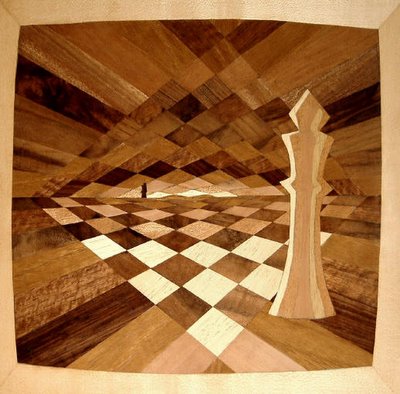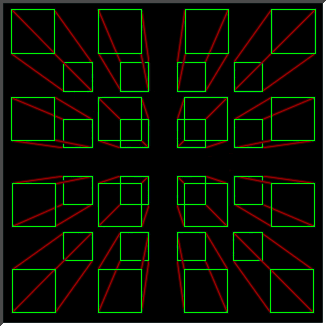

Nominalism --> voluntarism--> Luther and Calvin --> Kierkegaard --> Nietzsche --> Sartre --> Postmodernism
What is Nominalism? (or, the story of some "isms")
Premoderns were metaphysical realists, either extreme (Platonists) or moderate (Aristotelians).
Realists think there are “forms,” natures or essences, which exist independent of human minds. These natures, or essences are also called universals. Platonists thought those forms existed in a separate, transcendent realm: the Ideal world, as opposed to the material world. Aristotelians thought that (for the most part, with only a few exceptions) the forms existed in this world. “Moderate realists hold that there is no separate realm in which universals exist, but rather universals are located in space and time wherever they are manifest.” (Wikipedia.) Yet even though they might not exist in a separate world, these universals, or essences still are abstractions, or meta-physical entities, things which are known by the intellect, and not by the senses.
At the end of the middle ages, in the 14th century, an entirely new idea arrived, and one might consider it the death knell of premodernism and the birth of modernism. Nominalism is the view that there are no universals, and thus no essences. Nominalists hold that various objects labeled by the same term have nothing in common but their name. In contrast to Platonic realism ( which held that universals have a separate existence apart from the individual object) nominalism insists that reality is found only in the objects themselves, not in any meta-physical realm or principle. Thus the senses increasingly became the vehicle for deciding what is real.
For us today, comfortable as we are with scientific naturalism and a materialistic view of reality, none of this sounds very revolutionary. But consider the implications for premodern persons. “If there are no universals, then things are radically individualized” the premodern protests. “There is no way for things to be connected. Everything is autonomous.” Nominalism required a 180 degree intellectual shift for the medieval premodern mind, which had not hesitated to make distinctions between things, but did so in order to unite them ultimately in a great chain of being created by, sustained by, and redeemed by God:
“Philosophy is to distinguish (Philosophiae est distinguere). But its ultimate purpose is not to decompose things into fragments, but to appreciate more profoundly the diversity within unity, the multi-faceted constitution of being, the manner in which the object of philosophical inquiry is integrated.” http://www.cfpeople.org/Apologetics/page51a054.html
Nominalist thinkers did just the opposite. The revolution was led by William of Ockham and Francis Bacon. Holding things to be radically separate, nominalists like Ockham sought to impose some sort of order on the chaos, by grouping things together according to the needs and uses of the person knowing them. Rather than submitting and conforming one’s mind to reality one’s mind begins to actively shape reality.
The Nominalists agenda was also furthered by Francis Bacon’s new emphasis on knowing by induction rather than by deductive syllogism. Because the senses always only encounter individual particulars, they become the starting point for any sort of “objective,” factual knowing. Universals, abstractions, and other meta-physical items thus can never be known “objectively,” as facts, because they can never be immediately known through the senses. They can only be known subjectively, as matters of ‘belief.” Belief in turn becomes accepted as purely a matter of will, and so the stage is set for a voluntaristic God—a sovereign God whose essence is Will—and Who is the object faith, not reason.
“In the fourteenth century William of Ockham devised a nominalistic system of theology based on his belief that universals were only a convenience of the human mind. According to this view, the fact of a resemblance between two individuals does not necessitate a common attribute; the universals one forms in his mind more likely reflect one's own purposes rather than the character of reality. This led William to question scholastic arguments built upon such abstractions. As he argues in his Centilogium, systematization of theology must be rejected, for theology can ultimately be based only on faith and not on fact. Therefore, through grace and not knowledge, he accepted the teachings of the Roman Catholic Church, bowed to the authority of the pope, and declared the authority of Scripture. His follower, Gabriel Biel, would carry his thought to its logical conclusion and declare that reason could neither demonstrate that God was the First Cause of the universe nor make a distinction between the attributes of God, including God's intellect and will. The reality of the Trinity, as well as any theological dogma, can be found only in the realm of faith, not in the realm of reason. This was diametrically opposed to the natural theology of medieval scholasticism.”
(the above is taken from http://mb-soft.com/believe/txn/nominali.htm. For more about this transition, also see http://ic.net/~erasmus/RAZ229.HTM “The Influence of William of Ockham and Nominalism on Martin Luther and Early Protestant Thought,” compiled and edited by Dave Armstrong.)
Once immaterial, spiritual things are consigned to the realm of belief, not fact, they are forced to be objects of will, not reason. Kierkegaard sees this clearly, and fully embraces it, calling for the “leap of faith.” Nietzsche-- building upon Kant’s idea that all we can know are appearances (phenomena) never the reality (noumena)—further develops the significance of the will by insisting reality is the creation of the person with the most powerful will, the “ubermensch,” or “super-man.” Sartre can be seen as a kinder, gentler Nietzsche, whose mantra, “existence comes before essence” also underscores the superiority of will. For Sartre, I progressively define myself (and my reality) by my choices.
Philosophical postmodernism is the celebration of subjectivity, and the denial of any objective metaphysical, epistemological or moral absolutes, for “absolutes” are universal, and if there is nothing universal, then there is nothing absolute. It is no wonder, then, that Christians like Rodney Clapp ( A Peculiar People: The Church as Culture in Postmodern Society, InterVarsity, 1996) argue that philosophical Postmodernism can be seen as the final stage of modernist nominalism. It will be interesting to see how Protestantism, having been birthed by nominalism, extricates itself from nominalism’s suffocating grip.
1 comment:
"In epistemology, 'voluntarism' describes the view that belief is a matter of the will rather than one of simply registering one's cognitive attitude or degree of psychological certainty with respect to a stated proposition." (From Wikipedia)
Isn't Romans 4:18 thru 21 THE classic illustration of this very reality?
When all around the believer, the society in a million ways militates against His Truth, isn't the will involved in saying "I refuse to succumb to appearances; I stand on His [transcendent] promises and His Word!"?
E.E.
Post a Comment